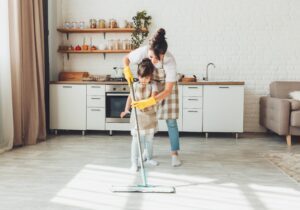Cleaning without chemicals: A safer, greener way
We look at everything you need to know to get started with natural cleaning methods, along with some easy DIY recipes and practical tips.
When it comes to keeping a clean, healthy home, many of us automatically reach for the brightly coloured bottles of commercial cleaning products. But did you know that the synthetic chemicals they contain can contribute to poor indoor air quality, irritated skin and even pose risks to your family’s health? As parents, creating a safe environment for our little ones is always a top priority. Thankfully, there’s a growing movement towards natural, chemical-free cleaning solutions that are just as effective, but kinder to both our health and the environment! So, consider switching things up and making your home shine without relying on harsh chemicals.
Why go chemical-free?
Cleaning products are often loaded with ingredients like ammonia, chlorine and phthalates – substances that can be harmful when inhaled, ingested or when they come into contact with skin. Prolonged exposure to these chemicals can trigger allergies, asthma and other respiratory issues, especially in young children whose immune systems are still developing.
Switching to natural, chemical-free cleaning methods can significantly reduce these risks, eliminating our exposure to unnecessary toxins and creating a healthier indoor environment. Not to mention, many chemical-free alternatives are more environmentally friendly, and by making your own, you can also save money.
Common ingredients
One of the best parts about going chemical-free is that you can use simple, everyday ingredients you probably already have in your kitchen to double up as powerful cleaning agents!
White vinegar
With its mild acidity, white vinegar can cut through grease, dissolve limescale and disinfect surfaces. It’s a fantastic all-rounder for cleaning kitchens and bathrooms, though be careful not to use it on natural stone surfaces, which can be damaged by acidic substances.
Baking soda
Mildly abrasive, baking soda is a wonderful scrub for sinks, countertops and grout. It also has natural deodorising properties, making it great for freshening up carpets, bins and fridges.
Lemon juice
Lemons are naturally antibacterial and have a fresh, uplifting scent. Their acidity makes them ideal for tackling hard water stains and brightening white surfaces.
Castile soap
Made from vegetable oils, castile soap is a gentle, non-toxic cleaner that can be used on its own or combined with other ingredients for a variety of cleaning tasks.
Essential oils
Tea tree, eucalyptus, lavender and citrus essential oils not only give off a lovely fragrance, they also have natural antibacterial and antifungal properties. Add a few drops to your cleaning solutions for a gorgeous scent and an extra germ-fighting boost.
Easy cleaning solutions
You don’t have to be a chemistry whiz to do this – these simple recipes can tackle a wide range of your household’s cleaning needs and are super safe!
All-purpose cleaner
Simply combine equal parts water and white vinegar in a spray bottle and add a few drops of your favourite essential oil. This mixture is perfect for cleaning glass, countertops and everyday spills. However, avoid using vinegar on marble, granite or other stone surfaces.
Baking soda scrub
This one is easy! Just mix a cup of baking soda with a few tablespoons of water to form a paste. Use this to scrub stubborn stains in sinks, bathtubs or on tiles. Add a squirt of your favourite castile soap for an extra boost.
Lemon disinfectant
Take half a cup of white vinegar and add the juice of one lemon and one cup of water. Spray onto your kitchen surfaces or chopping boards to disinfect them and leave everything smelling citrus-fresh!
Carpet deodoriser
Carpets are notorious for being a little bit stale, but also carpet cleaners have a reputation for being particularly harsh and unsuitable around kids. Instead, try sprinkling baking soda mixed with a few drops of essential oil over your carpets or rugs. Let it sit for fifteen minutes before vacuuming up. It sounds too good to be true, but this promises to neutralise any odours and freshen up your space.
Tips and tricks
What should you keep in mind when choosing this method of greener, safer cleaning?
Be patient
Chemical-free cleaning might require a little more elbow grease and time, especially if you’re dealing with stubborn stains. Trust that the results are worth it and take your time scrubbing and allowing the natural ingredients to work their magic.
Don’t mix everything
While natural ingredients are generally safe, some combinations can reduce effectiveness or create unwanted reactions. For instance, never mix vinegar and baking soda for a long-term cleaning solution, as they neutralise each other. They can be used on the same task (for instance to unclog a drain) but should be sprayed or used separately.
Ventilation
Even when using natural cleaning products, it’s a good idea to keep your home well-ventilated. Open your windows or turn on fans to help air out your rooms and ensure fresh airflow, especially if you use vinegar or strong-smelling essential oils.
Microfiber cloths
Microfiber cloths are perfect for chemical-free cleaning as they attract dirt, dust and grime with just water. They’re great for surfaces, glass and floors, and can be washed and reused multiple times – ideal!
A family affair
One of the wonderful things about chemical-free cleaning is that it’s safe enough for children to participate in. So get kids involved in simple tasks like dusting with a microfiber cloth or wiping down surfaces with a gentle all-purpose cleaner. This not only lightens your load but is also a safe way to teach little ones some essential life skills! You can even make it fun by playing music or turning it into a challenge!
Greener, cleaner benefits
By making the switch to natural cleaning products, you’re not only creating a safer environment for your family but also doing your part to reduce the chemical load on our planet. With a little experimentation and a shift in mindset, you’ll find that chemical-free cleaning is just as effective, if not more satisfying, than using store-bought alternatives. So, next time you reach for a cleaner, consider giving your DIY solutions a go!
Image Credit: ShutterStock












Comments